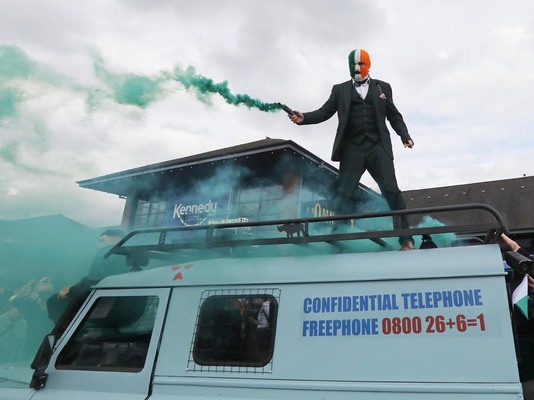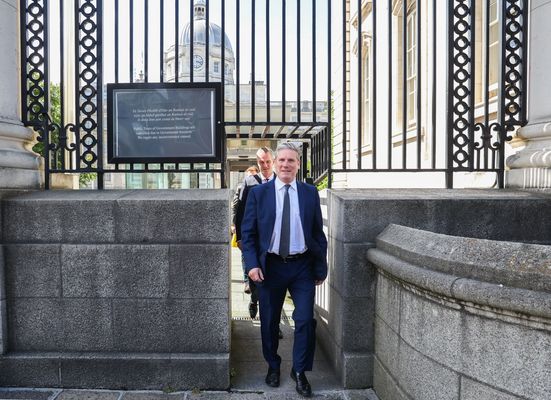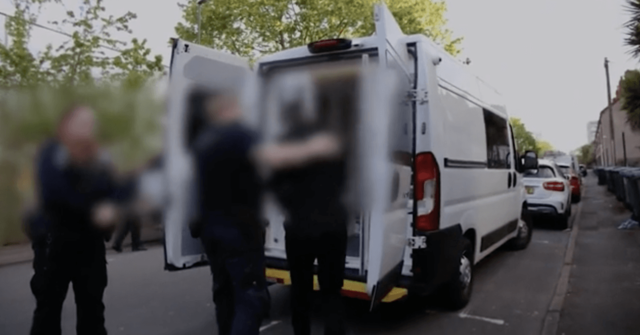In blood and death ’neath a screaming sky
I lay down on the ground
And the arms and legs of other men
Were scattered all around
Some cursed, some prayed, some prayed then cursed
Then prayed and bled some more
And the only thing that I could see
Was a pair of brown eyes that was looking at me
But when we got back, labelled parts one to three
There was no pair of brown eyes waiting for me.
Shane MacGowan (1957-2023)
IT is the 75th anniversary of the Genocide Convention and the Universal Declaration of Human Rights. So how are we doing?
On Friday last week (8 December), as Shane MacGowan’s funeral took place in Nenagh, the UN Security Council (UNSC) met to debate a resolution submitted by the United Arab Emirates (UAE), one of the UNSC’s ten non-permanent members. The resolution called for an immediate humanitarian ceasefire in Gaza, the immediate and unconditional release of all hostages, and for the UN Secretary-General (António Guterres) to report back to the UNSC on an “urgent and continuing basis”.
I've just invoked Art.99 of the UN Charter - for the 1st time in my tenure as Secretary-General.
— António Guterres (@antonioguterres) December 6, 2023
Facing a severe risk of collapse of the humanitarian system in Gaza, I urge the Council to help avert a humanitarian catastrophe & appeal for a humanitarian ceasefire to be declared. pic.twitter.com/pA0eRXZnFJ
The UAE – with the backing of 103 UN member states – took its lead from Guterres who alerted the Security Council using an article of the UN’s Charter which allows the Secretary-General to raise any matter “which may threaten the maintenance of international peace and security”. This provision is rarely used, but the situation in Gaza is so serious that the UN has reached the point that it is no longer possible to carry out its mandate to provide a humanitarian support system in the Gaza Strip – “we are at breaking point”. As he stated, “the people of Gaza are looking into the abyss. The international community must do everything possible to end their ordeal.”
Five countries – China, France, Russia, the UK and USA – are permanent members of the UNSC. They also have the power to veto any resolution, even if the other members, including the non-permanent members who represent various regions of the world, all vote in favour. Ireland has been on the UNSC on four occasions, for one year in 1962 and then for three two-year terms, the last of which was in 2021/22. Its membership of the UN was initially vetoed by the Soviet Union in 1949.
Invited to address the UNSC, the Israeli delegate argued that the only solution was a military one: that stability and security “can be achieved when Hamas is eliminated”. As for the humanitarian crisis, “Hamas is solely responsible for the humanitarian situation in Gaza”. And the UN was to blame for not creating more capacity to receive aid.
The Palestinian ambassador to the UN also addressed the Council. He asked, “Are we supposed to pretend we don’t know the objective is the ethnic cleansing of the Gaza Strip? … This is Netanyahu’s war … the war of the extremist coalition in power in Israel.” Most of the other country delegates supported the ceasefire resolution on humanitarian grounds, accepting the Secretary-General’s plea for the international community not to lose sight of the only viable possibility for a peaceful future – a two-State solution.
The British delegate, however, abstained. While criticising Israel over the illegal settlements, the British supported Israel’s goal of eliminating Hamas but called for it to be “targeted and precise in achieving that goal”. The resolution failed because the US vetoed it. The US delegate argued that “Hamas has no desire for peace or a two-State solution”. He could just as easily have argued the same about Israel – and supported a ceasefire.
International law has always been used selectively, as a tool for the West to legitimize militarism and policies that exert power and control over the countries they choose.
— Assal Rad (@AssalRad) December 9, 2023
But the US veto yesterday, against ceasefire, marked the end of the charade. This image will be historic. pic.twitter.com/QNV80rrQhl
The same day, the Biden administration approved the immediate supply of 14,000 shells for Israel's Merkava tanks, using emergency powers under the Arms Export Control Act. This avoided the scrutiny of Congress which is currently delaying the approval of a consignment of 45,000 shells. Last Thursday (7 December), an Israeli tank fired two such shells across the border into Lebanon, killing a Reuters journalist and wounding six others who were filming the shelling. 81 journalists have been killed so far.
20,000 defenceless people murdered, almost 70% of them women & children. Hospitals, schools, shops, roads destroyed. 1.8M expelled from their homes. Now being systematically starved. The US just sent 14,000 tank shells to Israel to keep it going. @SecBlinken is an amoral fraud https://t.co/rLGdNPfXgN
— Joe Brolly (@JoeBrolly1993) December 12, 2023
According to polling, Biden’s support for Israel is having a critical affect on voting intentions for next year’s presidential election. At risk is the support of younger age groups and also Arab groupings who are threatening to stay at home and not to campaign for Biden. He has also alienated some within the Jewish community.
BREAKING: Hours before the annual White House Hanukkah party, 18 Jewish elders chain themselves to the White House gates demanding @POTUS stop funding and arming the genocide in Gaza.
— Jewish Voice for Peace (@jvplive) December 11, 2023
Follow @JewishElders for more pic.twitter.com/OmA5bNO9PX
Britain has its own reasons for supporting Israel’s military objectives. At least four companies supply the parts which make up 15 per cent of Lockheed Martin F-35 fighter jets – “the most lethal, survivable and connected fighter jet in the world”. There are support ships in the Mediterranean and from RAF Akrotiri, Cyprus, surveillance aircraft are flying over Gaza which, according Defence minister Grant Shapps, are unmanned, unarmed and only used to hunt for Hamas-held hostages with British citizenship. However, the Ministry of Defence has confirmed to Janes (the military information service) that this is not the case, and that the aircraft include the manned ISTAR aircraft made by RTX (formerly Raytheon). ISTAR stands for intelligence, surveillance, target acquisition, and reconnaissance. Neither the MoD nor RTX has given any details as to what precisely is done with the intelligence gathered.
"According to Lockheed Martin, “the fingerprints of British ingenuity can be found on dozens of the aircraft’s key components”. Ingenious British hands look extremely bloody"
— Amelia Horgan (@AmeliaHorgan) December 11, 2023
I wrote about @Workers4Pal's pickets of arms factories & the F-35 supply chainhttps://t.co/N1heYazbkZ
Second only to the US, Britain is Israel’s most important trading partner. Politically, close ties with Israel are fostered through Friends of Israel groups – some 80 per cent of Tory MPs are thought to be members of Conservative Friends of Israel (CFI) which funded visits to Israel and the occupied West Bank for Suella Braverman (former Home Secretary) and James Cleverly (former Foreign Secretary and now Home Secretary) in 2015.
When she was SoS for International Development (2016-17), Priti Patel held a number of undisclosed meetings in Israel while “on holiday” and accompanied by the honorary president of CFI, Lord Polak. She claimed the Foreign Secretary (Boris Johnson) knew about the meetings. She had to resign for breaching the ministerial code. Patel’s time as SoS was marked by the freezing of aid to the Palestinian territories and then changing the funding model. She even recommended that some aid be diverted to support Israeli army field hospitals in the occupied Golan Heights.
Sunak cut the total British aid budget from 0.7 to 0.5 per cent of GDP from 2021/2 and aid to Gaza and the West Bank went down from $118 million in 2019 to $57 million in 2021 (in real terms). In contrast, Irish aid to Gaza and the West Bank doubled between 2015 and 2021 (OECD data). Per head of population, the UK supplied 85 cents in 2021, while Ireland (the republic) supplied $2.55 – three times as much. Some of the latter funded a school in the village of Khirbet Zanuta (West Bank) which, in a clear violation of international humanitarian law, was destroyed last week by a bulldozer after settlers drove out the villagers.
Statement by President Higgins on the destruction of school in Khirbet Zanuta https://t.co/VXp21O2bTa
— President of Ireland (@PresidentIRL) December 7, 2023
Last Sunday, the 34-member Executive Board of the World Health Organisation (a specialised UN body), met in emergency session to discuss Gaza. It passed a resolution by consensus calling for the immediate, sustained and unimpeded passage of humanitarian relief, including the access of medical personnel, and for all parties to fulfil their obligations under international humanitarian law relating to the protection of civilians in armed conflict and medical personnel – 214 killed and 247 injured so far.
Yesterday, @WHO and partners in #Gaza managed to deliver essential trauma and surgical supplies to Al-Ahli hospital to cover the needs of 1500 people, and to transfer 19 critical patients.
— Tedros Adhanom Ghebreyesus (@DrTedros) December 10, 2023
This was another very high-risk mission in the vicinity of active shelling and artillery… pic.twitter.com/NBihupJMMS
The next day, Egypt and Mauritania invoked a rarely used process which allows the General Assembly to step in if the Security Council is unable to do its job because a veto has been exercised. An emergency meeting of the Assembly, involving 193 countries, was held on Tuesday. The resolution “demanded” an immediate humanitarian ceasefire, the release of all hostages and for the warring parties to comply with international law. The resolution was passed by an overwhelming majority.
BREAKING: UN just overwhelmingly passed a resolution demanding a ceasefire in Gaza.
— sarah (@sahouraxo) December 12, 2023
Remember the countries who voted against and those who abstained.
They are complicit in Israel’s genocide against the people of Gaza. pic.twitter.com/QDuzlovaQc
As Christmas approaches and thoughts turn to one particular birth, it is worth reflecting that, on average, 180 women give birth in Gaza every day (UN data). Save the Children estimate that around 15,000 babies will have been born in Gaza between 7 October and the end of 2023, all of them at grave risk from the violence and lack of medical care, water and food. At least 25,000 children have been orphaned.
Brian Cox reads If I Must Die, by beloved Palestinian poet, teacher and martyr Refaat Alareer.
— Palestine Festival of Literature (@PalFest) December 12, 2023
Refaat was killed on December 7th by an Israeli airstrike.
This was the last poem he published. pic.twitter.com/sMVocn3nGA






